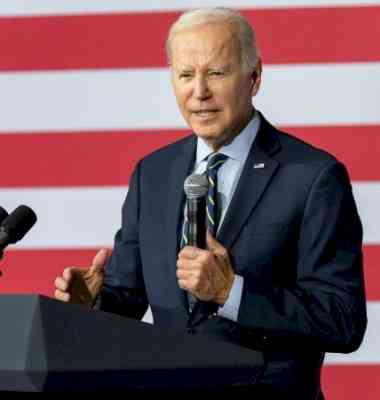Is US heading for a monetary crisis that could rattle global financial markets?
As Democrats worry if any default on interest payments by the US government on its securities would lead to a global monetary crisis plus a internal constitutional monetary crisis, the best financial brains of the White House and the legal department are at work to ensure it does not as they feel they can invoke the 14th Amendment as a saviour.

T.N. ASHOK
Washington, May 3 (IANS) As Democrats worry if any default on interest payments by the US government on its securities would lead to a global monetary crisis plus a internal constitutional monetary crisis, the best financial brains of the White House and the legal department are at work to ensure it does not as they feel they can invoke the 14th Amendment as a saviour.
Also, President Joe Biden is scheduled to meet House Speaker Kevin McCarthy on May 9 to resolve the crisis as part of a general discussion on fiscal issues.
At present, both sides are unrelenting in their stands - Biden does not want spending cuts to his welfare programmes and McCarthy feels useless expenditure cuts are enforced, the treasury will bleed out leading to a crisis in payments, media reports said.
The US government breached the debt ceiling limit early this year, crossing $1.4 billion, and asked the Congress, now retaken by the Republicans, to raise the borrowing limit of the government to redeem its interest payments to investors in US treasury bonds globally. The Republicans wanted Biden's administration to double down on its expenditure and enforce spending cuts on its social welfare programmes in exchange for raising the debt limit.
McCarthy has introduced a bill on behalf of the GOP to enforce spending cuts by the government in order to raise the debt ceiling limit and government ability to borrow to redeem its payments to investors. The government may run out of money if a solution is not found as early as next month, claims The New York Times in a report.
Biden officials are entertaining a legal theory that previous governments have ruled out before them.
During the meeting between Biden and McCarthy on May 9, both sides are expected to discuss and resolve their differences over spending cuts and raising the borrowing limit of the government to avoid a US monetary crisis that could rattle global financial markets.
Biden's government faces a constitutional challenge to the debt limit. His financial aides are floating a theory that the government could invoke the 14th Amendment to continue issuing new debt to pay the bondholders, social security recipients, government employees and others, even if the Congress fails to lift the limit before the so-called 'X' date.
As per Treasury Secretary Janet Yellen, the treasury can hold on to make payments till June end after which she would have to resort to extraordinary measures that could prioritise payments bringing into conflict of interests between Biden's welfare programmes and obligations to payouts to investors and bond holders. That could rattle vote banks in the Democrat-ruled states if senior citizens' benefits are not paid out. That too in an election eve year.
White House officials and media reports said that under the 14th Amendment to the Constitution, "the validity of US government's public legal debt including those incurred pension payouts and bounties for services in suppressing insurrection or rebellion shall not be called into question", reports said.
What is the 14th Amendment?
Top economic and legal experts say this theory gas been a subject of intense and unresolved debate in recent months. Will Biden support such a move is the question as the economy would face serious ramifications and the Republicans would be quick to challenge it in courts. If the debt issue continues in such a situation, it would avoid an immediate disruption in consumer demand by maintaining government payments, but borrowing costs will soar, at least temporarily, economists warn.
What is the debt ceiling?
The debt ceiling is a cap on government borrowing that federal authorities are allowed to draw via US Treasury securities, such as bills and savings bonds, to fulfil its financial obligations.
Since the US government generally runs on budget deficits - its expenditure is more than its tax revenues - it has reached $1.1 trillion in FY 23 - it has to necessarily borrow huge sums of money to pay its treasury bills to its holders and investors.
The debt limit has been breached. What next?
America breached the debt ceiling limit on January 19 this year. The Treasury Department will use "extraordinary measures" to redeem the government's fiscal obligations. These measures are accounting tools that can contain certain government investments to enable a continuity in the payment of bills. Those options could end by June next month.
What is at stake?
When the US government exhausts its extraordinary measures and becomes bankrupt or runs out of cash, it would be unable to issue new debt and pay its bills. The government then defaults on its debt when bondholders are to get their due payments.
Such a scenario would be economically devastating and could plunge the world into a financial crisis, warned the The New York Times in a special dispatch.
Can the government do anything to forestall the disaster?
As there is no rule book by which Washington can avoid a debt repayment crisis, the Treasury could try to prioritise payments, paying the bondholders first. But if the US defaults on its payments, it could throw global money markets into a major crisis, rattling bond holders and investors.
Theoretically, the Federal Reserve could step in to buy some of those Treasury bonds which are up for payments.


 IANS
IANS 










